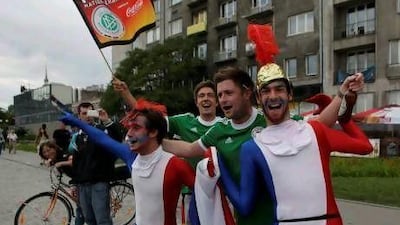WARSAW // The capital of Poland said its farewells to Euro 2012 last night, or at least it brought to an end its direct participation in the tournament, staging its last match.
There will be those who, ahead of the final in Kiev, wonder if these co-hosts, and not Ukraine, might have been better suited to staging Sunday's showpiece climax to the event.
The competing national teams certainly preferred Poland as a place to base themselves. Both finalists will tomorrow set off for Kiev from temporary, Polish camps they have come to regard as homely headquarters.
Warsaw seems, to the first-time visitor, a thoroughly westernised city, as least in its centre.
This should not a be a surprising statement, but given that less than a quarter of a century has passed since the fall of what was known as the Iron Curtain, the European frontier that separated a socialist and Soviet-dominated east from a capitalist west, there remains an outsider's attitude that Warsaw might seem very alien.
Poles are conditioned to visitors registering surprise at how familiar are the shops and retail chains that line Warsaw's wide avenues.
Hosting a high-profile event like these championships has, as part of its aim, to advertise a nation to the rest of the world, to show itself off as place where business opportunity exists, and where tourists will enjoy themselves.
Poland has certainly achieved that better than Ukraine, currently under scrutiny over the past three weeks for its high-profile human-rights problems.
There have been difficulties on the Polish side of Euro 2012, like the street-fighting between Poles and Russians ahead of the Warsaw fixture between the hosts and their long-time rivals to the east.
A tense political history had made that match a potential flashpoint. Polish-German political relations over the course of the centuries have had their downs, too.
Perhaps that was in the mind of the German fan, a man in his 60s, who proudly wore his white replica national team jersey and posed in front of a sign saying "Warsaw" ahead of last night's meeting with Italy. His hand and fingers were raised in the universal symbol for "peace".
About 25,000 of his compatriots had arrived in the Polish capital to be at the semi-final, outnumbering Italians nearly four to one.
As for the neutrals, their dream of seeing their own team involved in Warsaw's last match dissolved a while ago. Time will tell what other legacies, besides a splendid stadium in the capital, Euro 2012 has bequeathed them.
Follow us


